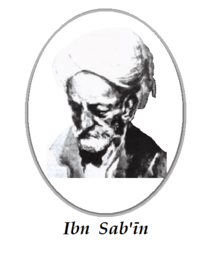Ibn Sab'in
Abu Mohammed Abd el-Hakh Ibn Sab'in (Arabic: محمدبن عبدالحق بن سبعين) was an Arab[1][2] Sufi philosopher, the last philosopher of the Andalus in the west land of Islamic world. He was born in 1217 in Spain and lived in Ceuta. He was known for his replies to questions sent to him by Frederick II, ruler of Sicily. He died in 1271 in Mecca. He was also known for his knowledge of religions (Judaism, Christianity but even Hinduism and Zoroastrism) and the "hidden sciences"[3] and has been variously depicted as a Neoplatonic philosopher, a Peripatetic philosopher, a Pythagorean philosopher, a Hermeticist, a Kabbalist, an alchemist, a heterodox Sufi, a crypto-Shi’ite, a plagiarizer, a pantheist and an arrogant seeker of fame.[4]
Abu Mohammed Abd el-Hakh Ibn Sab'in | |
|---|---|
 | |
| Personal | |
| Born | 1216/1217 CE |
| Died | March 21, 1271 CE (9 Shawwal 669 AH) |
| Religion | Islam |
| Main interest(s) | Sufism and philosophy |
| Notable work(s) | Sicilian Questions |
| Muslim leader | |
Influenced
| |
His school is a combination of philosophical and Gnostic thoughts.
He was recognized by Michele Amari[5] as the author, among others, of the responses to the famous Sicilian Questions of Frederick II of Hohenstaufen.[6]
Notes
- Leaman, Oliver (2013-03-07). History of Islamic Philosophy. Routledge. ISBN 9781136780448.
- Leaman, Oliver (2015-07-16). The Biographical Encyclopedia of Islamic Philosophy. Bloomsbury Publishing. ISBN 9781472569455.
- S. H. Nasr (2006), Islamic Philosophy from Its Origin to the Present: Philosophy in the Land of Prophecy, State University of New York Press, p. 156-157
- Cook, Benjamin G. (2012-07-01). "Ibn Sabʿīn and Islamic Orthodoxy: A Reassessment". Journal of Islamic Philosophy. Retrieved 2019-06-25.
- Michele Amari, Questions philosophiques adressées aux savants musulmans par l'Empereur Frédéric IIe, in Journal asiatique, Ve serie, 1, Paris, 1853, p.240-274 http://gallica.bnf.fr/ark:/12148/bpt6k931611/f240.pagination.r=Michele+Amari.langEN
- See:Luisa Arvide, Las Cuestiones Sicilianas de Ibn Sabin, GEU, Granada 2009 (in Arabic and Spanish).